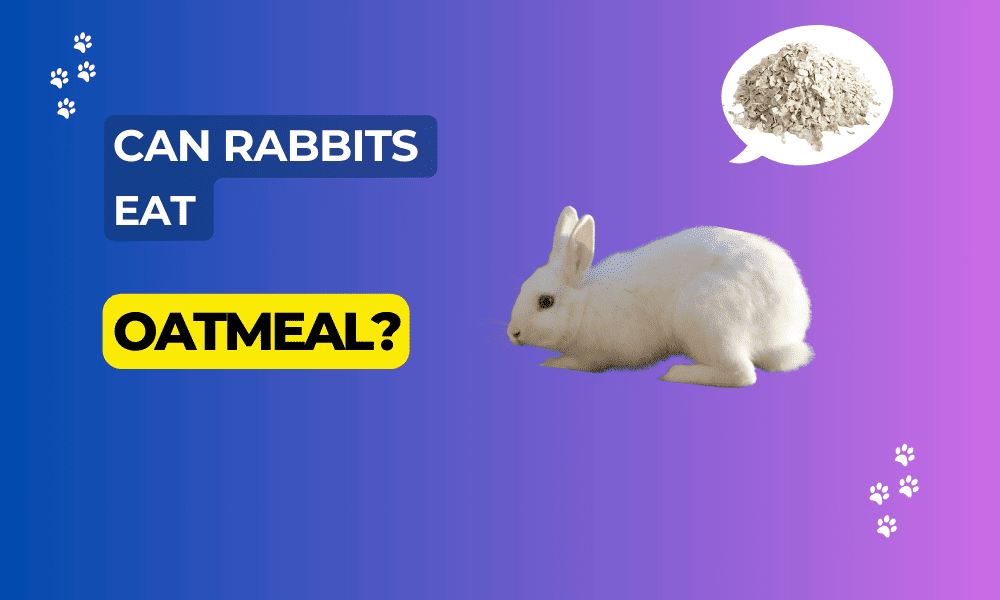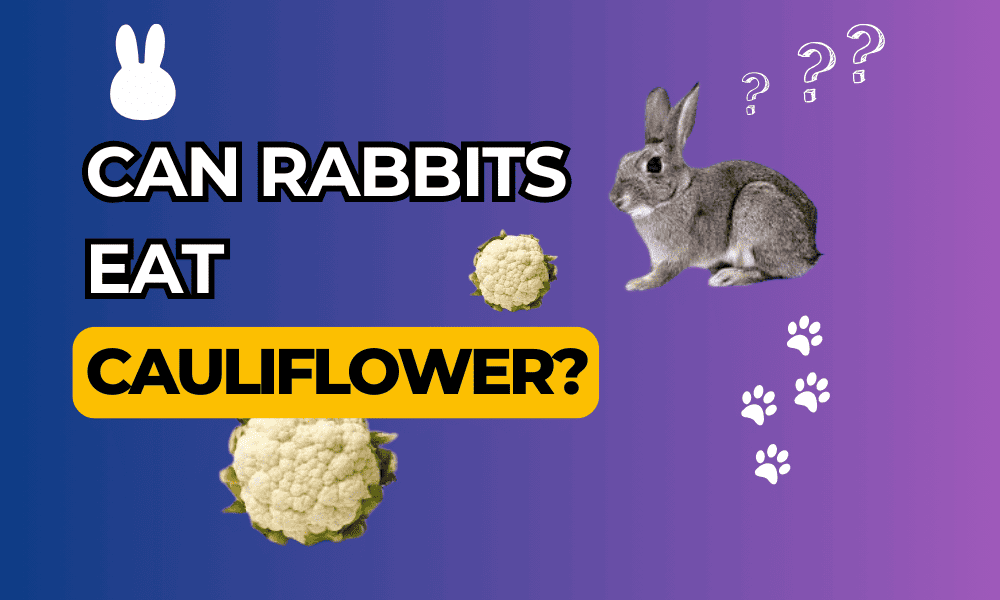
When it comes to feeding rabbits, many pet owners often wonder whether certain human foods are safe for their furry companions. One common question is: Can rabbits eat oatmeal? While rabbits primarily thrive on hay, fresh vegetables, and water, it’s natural to consider other foods like oats as potential treats. In this article, we’ll explore whether oatmeal is safe for rabbits, its benefits and risks and how to incorporate it safely into a rabbit’s diet.
Is Oatmeal Safe for Rabbits?
Oatmeal can be safe for rabbits, but it should only be given in moderation. Unlike their natural diet, oatmeal is not an essential food for rabbits. A rabbit’s diet should mainly consist of high-quality hay, such as timothy hay, to support digestion. Fresh leafy greens and clean water are also essential for its health. Oatmeal does not offer the same fiber content as hay, which is crucial for a rabbit’s digestive health.
Can Bunnies Eat Oats?
Yes, bunnies can eat oats, but there are some important considerations to keep in mind. Oats, being a type of grain, can be a higher-calorie option than most vegetables and hay. While they aren’t toxic, feeding your rabbit too much oatmeal can lead to weight gain and other health issues. It’s best to think of oatmeal as an occasional treat rather than a regular part of your rabbit’s diet.
Other Rabbit Diet Guides:
Can Rabbits Eat Lettuce?
Can Rabbits Eat Kiwi Fruit?
Can Rabbits Eat Mushrooms?
Can Rabbits Eat Oranges?
Can Rabbits Eat Peaches?
Oatmeal for Rabbits: Benefits and Risks

Feeding rabbits oatmeal comes with a set of benefits and risks. Let’s take a closer look at both sides:
Benefits of Oatmeal for Rabbits
- Source of Energy: Oatmeal is calorie-dense, which can help provide an energy boost, especially for underweight rabbits.
- Supports Weight Gain: If a rabbit is recovering from an illness and needs to gain weight, oats can be beneficial in small amounts.
- Appealing Treat: Rabbits often enjoy the taste of oats, making it a palatable option for rewarding or bonding.
Risks of Feeding Rabbits Oatmeal
- Low Fiber Content: Unlike hay, oatmeal does not provide the high fiber content essential for healthy digestion in rabbits.
- High Calorie Count: Regular feeding can lead to obesity, which can contribute to other health problems like arthritis or heart issues.
- Digestive Issues: Oatmeal can be difficult for some rabbits to digest, especially when fed in large amounts.
- May Cause Selective Eating: Rabbits might develop a preference for oatmeal over healthier options like hay, leading to an unbalanced diet.
Nutritional Value of Oatmeal
To understand how oatmeal fits into a rabbit’s diet, let’s take a look at its nutritional content per 100 grams:
| Nutrient | Amount per 100g |
| Calories | 389 kcal |
| Carbohydrates | 66 g |
| Fiber | 10.6 g |
| Protein | 16.9 g |
| Fat | 6.9 g |
| Calcium | 54 mg |
| Iron | 4.7 mg |
| Magnesium | 177 mg |
As shown in the table, oatmeal is relatively high in calories and carbohydrates but lower in fiber compared to hay. This difference in nutritional value is why it should only be used as a supplement rather than a main component of the diet.
Can Rabbits Eat Dry Oats?
Dry oats can be fed to rabbits, but only in small quantities. They are less processed and closer to their natural state, which makes them a better option than flavored or sweetened oatmeal. However, due to the low moisture content, it’s important to ensure that your rabbit has access to plenty of fresh water to prevent dehydration.
Should You Cook Oatmeal for Rabbits?
Feeding cooked oatmeal to rabbits is not recommended, as it can be difficult for them to digest. Cooked foods can be sticky, making it difficult for rabbits to digest. Additionally, cooking oatmeal changes its nutritional composition, which might not be suitable for rabbits’ dietary needs.
How to Safely Feed Oatmeal to Rabbits
If you decide to give oatmeal to your rabbit, here are some guidelines for doing it safely:
- Feed Small Amounts: Start with a small pinch of dry oats to see if your rabbit likes it and tolerates it well.
- Observe Your Rabbit’s Behavior: After feeding oatmeal, watch for any signs of digestive upset such as soft stool, diarrhea, or loss of appetite.
- Mix with Hay: If you want to encourage healthy eating, mix a tiny amount of oatmeal with hay. This ensures that your rabbit still gets plenty of fiber.
- Avoid Sugary Varieties: Steer clear of flavored or sweetened oatmeal products, as they contain added sugar and artificial ingredients harmful to rabbits.
Alternatives to Oatmeal for Rabbits
If you’re looking for healthy treats to feed your rabbit, here are some better alternatives:
- Fresh Leafy Greens: Options like romaine lettuce, cilantro, and parsley are great low-calorie, high-fiber treats.
- Herbs: Dried herbs like basil or mint can add some flavor variety to your rabbit’s diet.
- Vegetables: Carrot tops, broccoli leaves, and bell pepper strips are tasty options, but they should also be given in moderation.
Signs Your Rabbit Should Avoid Oatmeal
If your rabbit experiences any of the following symptoms after eating oatmeal, it’s best to avoid feeding it in the future:
- Diarrhea or soft stools
- Lethargy or unusual tiredness
- Loss of appetite
- Excessive weight gain
These signs indicate that your rabbit can’t digest oatmeal well, or you may have given too much at once.
Also read: How to stop rabbits from eating flowers?
When is Oatmeal Beneficial?
While oatmeal is not a standard part of a rabbit’s diet, there are some instances where it can be useful:
- For Underweight Rabbits: If your rabbit is significantly underweight, adding small amounts of oats may help with weight gain. It’s always a good idea to talk to a vet before changing your rabbit’s diet. Even foods that seem safe can upset their sensitive digestion. A vet can help you choose the right treats based on your rabbit’s age, health, and daily needs—so you’re not guessing what’s best for them.
- During Cold Weather: In cold climates, some rabbit owners give their rabbits a small amount of oatmeal to provide extra energy.
How Often Should You Feed Oatmeal to Rabbits?
If you decide to feed oatmeal to your rabbit, it should be limited to no more than once a week and in very small quantities (about half a teaspoon). Feeding it too often can throw off their diet. Rabbits need mostly hay to stay healthy, and too many extras can cause problems.
Common Misconceptions About Oatmeal and Rabbits
Oatmeal is a Staple Rabbit Food
Contrary to popular belief, oatmeal is not a staple in a rabbit’s diet. It lacks the necessary fiber and other nutrients found in hay and leafy greens. Using it as a regular food source could harm your rabbit’s health.
Rabbits Can Eat All Human Foods
Rabbits have sensitive digestive systems that are not equipped to handle many human foods. What may seem healthy for us can be problematic for them, and oatmeal is a good example of a treat that needs moderation.
Conclusion
So, can rabbits eat oatmeal? Yes, but only occasionally and in very small quantities. While oatmeal can provide a temporary energy boost or aid in weight gain, it lacks the high fiber content essential for a rabbit’s digestive health. Feeding rabbits oatmeal should always be done with caution, keeping the portion size minimal and making sure their primary diet remains balanced with plenty of hay and fresh vegetables.
FAQs: Is Oatmeal Safe for Rabbits?
Can I feed oatmeal to rabbits?
Yes, but only in small amounts. Plain, uncooked oats can be given as a rare treat. They should never replace hay, greens, or pellets.
How to make oats for rabbits?
Keep it simple. Use plain, dry oats. Don’t cook them or mix them with milk or sugar. Sprinkle a small pinch over hay or mix with safe herbs. That’s enough for a healthy treat.
Is oatmeal safe for rabbits to eat every day?
No, oatmeal is not safe for daily feeding. While not toxic, it’s too starchy for a rabbit’s digestive system and can cause weight gain or gut problems if given too often.
Can bunnies eat oats as a main food source?
No, rabbits should not eat oats as their main food. They need high fiber hay as the base of their diet. Oats lack the fiber rabbits need to stay healthy.
How much oatmeal can I give my rabbit?
Only offer oatmeal as an occasional treat—no more than a teaspoon once or twice a week. Always serve it plain, with no sugar, milk, or flavorings.
Are there any alternatives to oatmeal for rabbit treats?
Yes, safer treats include small pieces of apple, banana, or herbs like parsley and basil. These are easier on digestion and more aligned with a rabbit’s natural diet.
Is cooked oatmeal better than raw oats for rabbits?
No, cooked oatmeal is not better. Cooking oats alters their structure, making them heavier and more difficult for a rabbit’s digestive system to handle properly. If you must offer oats, always choose plain, uncooked ones in very small amounts.
Can baby rabbits eat oatmeal?
No, baby rabbits should not eat oatmeal. Their digestive systems are still developing, and they need a diet of mother’s milk, alfalfa hay, and age-appropriate pellets. Oats can cause serious digestive issues in young rabbits.
How often can I give my rabbit oats safely?
Oats should be a rare treat—no more than once a week and in small portions. Excessive consumption may lead to weight gain and digestive disturbances. Maintaining a balanced diet with appropriate portion sizes is essential for overall health. Treats should never replace hay or leafy greens.
What should I do if my rabbit ate too much oatmeal?
Watch for signs of discomfort like bloating, soft stools, or a lack of appetite. Make sure your rabbit eats hay and drinks water. If symptoms last more than a few hours, contact a rabbit-savvy vet.
Are flavored or instant oats safe for rabbits?
No, flavored or instant oats are not safe. They often contain added sugars, salt, or artificial ingredients that can harm your rabbit. Only plain, unflavored oats should ever be considered and only as a rare treat.
Can I mix oatmeal with my rabbit’s hay?
Yes, mixing a tiny amount of oatmeal with hay can encourage rabbits to eat more hay while still enjoying the treat.
What kind of cereal can rabbits eat?
Most cereals aren’t safe. Avoid sugary or processed ones. Only plain, unsweetened oats or shredded wheat with no added ingredients are safe occasionally.


